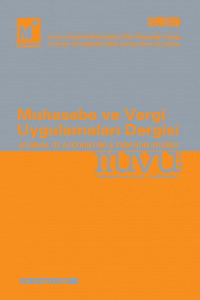YENİLİKÇİ BİR YÖNETİM MODELİ: BÜTÇESİZ YÖNETİM (BEYOND BUDGETING)
Bütçeleme, Bütçesiz Yönetim, İşletme Bütçeleri
INNOVATIVE MANAGEMENT MODEL: MANAGEMENT WITHOUT BUDGET (BEYOND BUDGETING)
Budgeting, Management without Budget, Business Budgets,
___
- Aktan, C. (1999). 2000’li Yıllarda Yeni Yönetim Teknikleri (4): İnsan Mühendisliği, İstanbul.TÜGİADYayınları http://www.canaktan.org/yonetim/insanyonetim/neo-klasik.htm [accessed 29.01.2017]
- Atkinson, A.A., Kaplan, R.S., Matsumura, E.M. & Young S.M., (2012). Management accounting: Information for decision-making and strategy execution. 6th Edition. Pearson.
- Bartram, P. 2006. Forecasting the end for budgets. Director. 60 (1), p.30.
- Becker, S., Messner, M. and Schaffer, U. (2009). The Evolution of Management Accounting Idea: The Case of Beyond Budgeting. Working paper. http://www.hec.unil.ch/hec/hec_en_bref/evenements/BeyondBudgeting_Lausanne_Oct2010.pdf [accessed 19.02.2017]
- Bogsnes, B.. 2009. Implementing Beyond Budgeting – Unlocking the Performance Potential. NJ: John Wiley & Sons.
- CIMA (2007). Beyond Budgeting. [Online] Available at: http://www.cimaglobal.com/documents/importeddocuments/cid_tg_beyond_budgeting_oct07.pdf [Accessed: 28/11/16]
- Cranfield University School of Management, (2001). Driving Value Through Strategic Planning and Budgeting. http://www.som.cranfield.ac.uk/som/dinamic-content/media/CBP/
- Hansen, S.C., Otley, D.T.& Van der Stede W.A.. (2003). Practice Developments in Budgeting: An Overview and Research Perspective. Journal of Management Accounting Research. 15, pp.95-116.
- Hope, J & Fraser, R. (2001). Beyond Budgeting, Questions and Answers. CAM-I Beyond Budgeting Round Table. https://pdfs.semanticscholar.org/
- Hope, J. & Fraser, R.. (2003). Who needs Budgets? Harvard Business Review, 81 (2), pp. 108–115.
- Libby, T. & Lindsay, R.M., 2010. Beyond budgeting and budgeting reconsidered? A survey of North-American budgeting practices, Management Accounting Research, 21(1), pp.56-75.
- McNally, R.. 2002. The annual budgeting process. Accountancy Ireland, 34(1), pp.10-12.
- Neely, A., Bourne, M. & Adams, C.. 2003. Better budgeting or beyond budgeting? Measuring Business Excellence. 7(3), pp.22-28.
- Olesen, A., 2010. Coloplast: “No more budgets!”. Beyond Budgeting Institute June 2010. www.bbrt.org
- Olesen, A., 2013. Handelsbanken: Consistency at its Best. Beyond Budgeting Institute, www.bbrt.org
- Østergren, K. & Stensaker, I.. (2011). Management control without budgets: A field study of beyond budgeting in practice. European Accounting Review. 20(1), pp.149-181.
- Rickards, R.C.. 2006. Beyond budgeting: boon or boondoggle? Investment Management and Financial Innovations. 3(2), pp. 62-76.
- Wallander, J.. 1999. Budgeting- an unnecessary evil. Scandinavian Journal of Management. 15(4), pp. 405- 421.
- www.kfknowledgebank.kaplan.co.ukhttp://bbrt.org/the-beyond-budgeting-principles/
- ISSN: 1308-3740
- Yayın Aralığı: Yılda 2 Sayı
- Başlangıç: 2008
- Yayıncı: Ankara Serbest Muhasebeci Mali Müşavirler Odası
ÇALIŞMA SERMAYESİ İLE EKONOMİK KATMA DEĞER ARASINDAKİ İLİŞKİ: BORSA İSTANBUL ÜZERİNE BİR ARAŞTIRMA
Ozan BÜYÜKYILMAZ, Hakan VARGÜN, Hasan UYGURTÜRK
Hüseyin İSKENDER, Metin BAYRAM
TFRS 15 MÜŞTERİ SÖZLEŞMELERİNDEN HASILAT STANDARDI: İNŞAAT SÖZLEŞMELERİ ÜZERİNE BİR UYGULAMA
Metin SABAN, Serhan GÜRKAN, Hakan VARGÜN
Mehmet GÜNLÜK, Gökhan ÖZER, Murat ÖZCAN
YENİLİKÇİ BİR YÖNETİM MODELİ: BÜTÇESİZ YÖNETİM (BEYOND BUDGETING)
